|
I remember 1985 as the year when I discovered that my favorite television series of youth, the animated space opera Star Blazers, wasn't a complete and utter fluke. Into the midst of an afternoon programming block consisting of half-hour toy commercials like Transformers, G.I. Joe, and He-Man (possibly the stupidest name for a show in history), came Robotech, a serious-minded, multi-generational epic about humanity's involvement in a series of alien invasions. The art was unique and dynamic, nobody broke the fourth wall at the end of an episode to relate the day's moral, and ever so often characters you liked would just up and die, sometimes rather ignominiously. It was war, after all, and Robotech brought a realistic treatment to the subject that was almost unprecedented for the time. 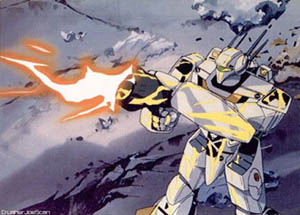
In the far-flung future of 1999, a spacecraft crashes on Earth on an island in the South Pacific, unleashing a powerful electromagnetic force and a black smoke monster-oops, wait; wrong island-bringing with it the secrets of advanced alien technology. Ten years later, the aliens who lost the ship arrive to reclaim it and find themselves joined in a war with the human race, after the ship activates an automatic defense system and fires the first shot on our behalf. Following a massive conflict which has devastating consequences for Earth, the defense forces propose a mission to the alien homeworld, intending to pre-emptively halt the possibilities of any future invasions. Like ships that pass in the night, the alien overlords arrive on Earth in the absence of its space fleet, intent on recovering the wreckage of the original ship, which seemingly contains the secrets of a power source essential for their survival. Their failed attempt at reclamation attracts the attention of their rivals, the Invid, from whom they stole the energy in the first place, and Earth becomes subjugated and occupied by these new invaders. Slowly a resistance movement forms as both civilians and surviving defense force members band together and await the return of the space fleet that departed decades before. It's huge, melodramatic, and arrived at exactly the right time for a sixteen year-old SF fan like I was. And then, partway through the third chapter of the Robotech series, I acquired the official art book for the show and discovered what is quite obvious in hindsight but which I'd not even suspected back then: the multiple "generations" of the story were completely separate shows which had had no connection to one another prior to being dubbed in English. 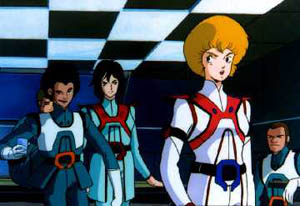
This, then, was the cognitive dissonance of Robotech: though I'd no knowledge of the original three series of which it was comprised, taking it at face value became a near-impossibility. Events became suspect at every juncture; what was really going on? Finding out the truth when I did was particularly galling, as it meant that the much ballyhooed return of original hero Rick Hunter was an empty hope. Somehow or another, it would, by necessity, fail to actually happen, as indeed was the case. There were no crossover characters between the three original series, nor any of the same fighter craft or other combat vehicles (heck, the middle series didn't even actually take place on Earth, which explained that suspicious extra moon that showed up on occasion). The American production company, Harmony Gold, had stitched the three series together in order to make it more desirable for syndication purposes. The original music scores had been thrown out in favor of original compositions that would provide a unified soundtrack. Familial relationships were established between characters in the different casts, and the catch-all term "Veritech" was applied to combat craft across all three shows (series supervisor Carl Macek would later attribute the term to a contraction of "very technical," which made it sound far less cool in retrospect) to further establish a sense of continuity. Yet, for all this tinkering, it was by and large successful. Given the similar design work between the Japanese productions of Macross, Southern Cross, and Mospeada, it all flowed far better than one might suspect from such a description. In many ways, the artificial linkages gave the whole affair a greater sense of epic scale than it originally had. In Japan, sequels to the Macross series persist to this day, most of them far inferior to the original, some of them downright embarrassing. It's somewhat ironic that the reverse-engineered Robotech continuity fared better in many ways. Twenty-five years later, it remains Harmony Gold's most successful venture, and was probably more singularly responsible for popularizing Japanese animation in the US than any other prior production (the worth of that fact in itself is, of course, highly debatable). 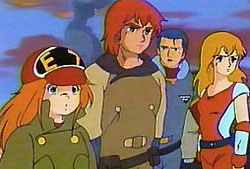
Yet for all of its accomplishments in bringing Japanese-style drama to the barren wastelands of after-school syndicated programming of the mid-'80s, Robotech has remained mired in controversy since its arrival on the airwaves. Veteran fans took offense at the liberties taken with the source material, the unlikelihood of the then-popular Macross series reaching the States in any other way seeming quite beside the point. In all fairness, neither Macross nor Mospeada were changed in any terribly significant way, and Southern Cross had been a ratings failure to begin with, and thus was not championed by legions of dogmatic fans objecting to the rather extensive alterations it suffered in the process of making it the linking device bridging the other two. Nevertheless, even in those far pre-Internet days of anime fandom, there were purists who were already familiar with the Japanese versions, particularly in the case of Macross, who objected to the re-writing on general principle. And while Robotech did more right than wrong, there were legitimate gripes one could easily concede. There was the fact that the American supervisors' obsession with lip-sync often resulted in stiff line readings, as well as an ungodly number of instances wherein characters would exclaim "huh?" at any and everything imaginable. There was the fact that a pop singer character got saddled with a total of two songs for the first twenty-six episodes of the show, both of them grandly terrible and poorly performed. There was the overused narrator, who would impart such information as "Minmei runs to the park, lost in sadness," as the character of Minmei is seen running to a park and looking sad. Other instances of narration would flatly contradict previously established plot points, or, for that matter, plot points happening on screen at the time: a third-series episode features the narrative description of the aliens "carefully planting their agent" as the on-screen animation actually shows a scene of an alien transport ship breaking open and dropping an alien embryo in what is clearly an accident. Most of all, there was the concept of Protoculture, a thread meant to link the motives of the three alien races, which was hazily defined at best. A term lifted from the original Macross, it had referred to both the ancestral race that had spawned the aliens, and the behavioral characteristics of that race, e.g. gender-mixed society, art and music, and procreation. Robotech's version of the Macross episodes often used the term in essentially the same way, with alternate usages implying that it described a source of energy. Southern Cross fully switched over to the latter definition, with Protoculture specifically deemed the life-giving power source of the Robotech Masters, whose highly dependent race will die without the Protoculture factory buried in the ruins of their lost space fortress. Their existing supply is being gradually used up or becoming infected with the Invid Flower of Life, which renders it inert and useless-at least, that is, until the Mospeada episodes redefine it again as a power source that comes from the Invid flower, making the Masters' dilemma an apparently false one. 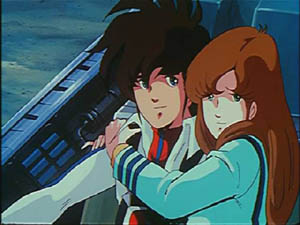
In many ways, then, Robotech demonstrated that the truest test of devotion is the devotees' willingness to overlook imperfections, of which there were many. Yet almost more frustrating than the series itself was Robotech's dubious legacy and fan following. A Robotech movie concocted from another unrelated feature and hefty amounts of stock series footage was a commercial failure and, perhaps more importantly in the long run, failed to fit into the established continuity with any grace. An ambitious proposal, an original 65 episode Robotech sequel entitled The Sentinels, fell apart for various economic reasons after only three episodes were finished, which were then assembled into a standalone feature that varied wildly in animation quality from scene to scene and which answered nothing about the original Robotech's cliffhanger ending. A later, CG-animated series to be titled Robotech 3000, set a millennium in the future and featuring none of the original characters, met with a scathing reception and never got past the pilot film stage. A subsequent sequel feature, The Shadow Chronicles, was actually completed, but was middling at best and still left the fate of the original cast unresolved, presumably in an attempt to pave the way for more sequels which, as of this writing, have never come. Worse, Robotech's die-hard adherents have often been less than honest in handing out credit. A posthumous retrospective on the recently-deceased Carl Macek gave him sole credit for creating the series, even though many of the plot points and even dialogue were translated intact from the originals. Perhaps most bafflingly, claims that Robotech was responsible for saving three previously unpopular shows from oblivion beg credulity. In the case of Southern Cross, which had ended its run early due to low ratings, there might be a kernel of truth here. For Mospeada, not so much; though it had suffered in the ratings and had been dealt a poor time slot, it had been revived thanks to a passionate following, and spawned a retrospective/music video collection set a year after the events of the series. But Macross? The most popular animated series ever produced in Japan at the time? The series that was so loved that audience demands for more of it caused its extension by nine episodes past the original finale? The show that spawned the most expensive animated feature film Japan had yet produced, the glorious Macross: Do You Remember Love? The very Macross that, as previously noted, continues to inspire sequels nearly thirty years later? The very idea, parroted by those who either don't know or who wish, decades later, to legitimize Robotech's existence, is patently ludicrous. It's implausible, it's dishonest, and it quite simply did not happen that way. Moreover, claims that no previous English version of Japanese animated product had escaped "dumbing down" overlook Star Blazers, which had come six years earlier. While it had suffered more under the censor's knife, it also benefited from better voice acting and a more accurate translation of its source material. In their zeal to extoll the virtues of their beloved Robotech, its fans have habitually disregarded any facts which contradict their preferred version of history. 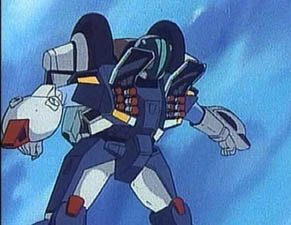
Nevertheless, it would be wrong to judge a show by the shortcomings of its fans or creative forces. Robotech told a good story, even if the actual telling of it wasn't optimally achieved. I've little doubt that it would've been more warmly embraced had it actually been structured the same way in its country of origin; indeed, the continuing popularity of the animated epic Mobile Suit Gundam, which has mined much the same territory and gone through many total cast changes of its own, pretty much confirms it. A war story on the surface, Robotech consistently attacked the "us versus them" attitude of nationalism and extolled the virtues of soldiers who dared not to be true believers, recognizing the need to defend home and family without succumbing to macho chest-beating and xenophobia. Robotech came along at a time when its likes were sorely needed, and it will always hold a special place in my personal nostalgia, even though I can say with virtual certainty that I'll never sit down and watch it again. To do so would involve sitting through a dozen instances of Lynn Minmei singing "Stage Fright," which simply takes the matter off the table. -review by Matt Murray
|
|
||||||||